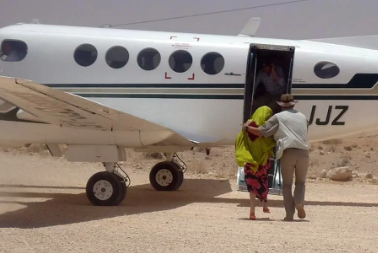“The market is now too inflated,” one experienced security consultant told me.
一位經驗豐富的安全顧問告訴我:“現在綁架的贖金太高。”
“Governments have deep pockets and are basically unable to do what a traditional K&R consultant would do,
“政府財力雄厚,基本上無法做傳統的綁架和贖金保險顧問會做的事情,
which is to put up resistance, to claim an inability to pay, to bargain, to try and disincentivise the crime.”
也就是抵抗,聲稱無力支付,討價還價,試圖抑制犯罪”。
Such arguments may seem self-serving, but there is evidence to support them.
這樣的論點似乎是自私的,但有證據支持它們。
In one case, a New York Times journalist who was captured in Afghanistan in 2008 tried to argue with his captors,
在一個案例中,2008年在阿富汗被捕的《紐約時報》記者試圖與綁架者爭辯,
who were demanding $25m and the release of 15 prisoners. He told them they were out of touch.
他們要求2500萬美元和釋放15名囚犯。他告訴他們,他們失去了聯系。
They countered that the French had recently paid $38m for the release of an aid worker,
他們反駁說,法國最近支付3800萬美元解救了一名援助工作者,
and that an Italian journalist had been ransomed for $15m and the release of several prisoners.
一名意大利記者被贖回,代價是支付1500萬美元,還有釋放幾名囚犯。
Quickly capitulating to high ransom demands – as some European and Asian governments have done –
迅速向高額贖金要求投降——就像一些歐洲和亞洲國家政府所做的那樣——
makes kidnapping more attractive and lucrative around the world.
使得綁架在世界范圍內更具吸引力和利潤。
While governments might make a distinction between proscribed and criminal groups, kidnappers don’t.
雖然政府可能會對被禁組織和犯罪集團做出區分,但綁架者不會。
And so the markets are inextricably linked.
因此,這些市場是不可分割地聯系在一起的。
So what should governments do? If the goal is to bring the hostages home safely
那么政府應該做些什么呢?如果目標是把人質安全帶回家,
while reducing the threat of future kidnapping and minimise the money flowing to terrorist groups,
同時降低人們未來被綁架的威脅、將流向恐怖組織的資金降至最低的話,
then there are legitimate questions about whether the no-concessions policy is achieving the desired result.
那么,關于“不讓步”政策是否取得了預期結果的合理問題就出現了。

First, a series of studies carried out in recent years provide little evidence that kidnapping victims are targeted according to nationality.
首先,近年來進行的一系列研究幾乎沒有證據表明綁匪是根據國籍確定的受害者。
Thus refusing to pay ransom does not appear to reduce the incidence of the crime,
因此,拒絕支付贖金似乎并沒有減少犯罪的發生,
but does greatly increase the likelihood that the victim will be killed.
但會大大增加受害者被殺的可能性。
Perversely, in the current environment, it may actually increase the money flowing to terrorists,
反常的是,在當前環境下,它實際上可能增加流向恐怖分子的資金,
because kidnappers can execute their British and American hostages,
原因就是,英美兩國采取不讓步政策,這導致兩國的人質沒有什么價值,
who because of the no-concessions policy have little value,
所以綁匪可以處死他們的英國和美國人質,
as means of putting pressure on the European countries that pay multi-million-dollar ransoms.
將此作為對支付數百萬美元贖金的歐洲國家施加壓力的手段。
This is why the problem must be defined differently and more narrowly.
這就是為什么要對這個問題做出不同和更狹義的定義。
How can western countries work together not to stop ransom payments to terrorist kidnappers – which is an unattainable goal –
西方國家如何能齊心協力,不停止向恐怖主義綁架者支付贖金——這是一個無法達到的目標——
but rather to minimise their size? Clearly, the K&R industry has a key role to play.
而是將它們的規模最小化?顯然,綁架和贖金行業將扮演一個關鍵角色。



